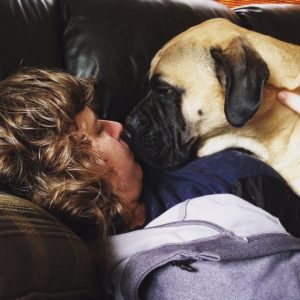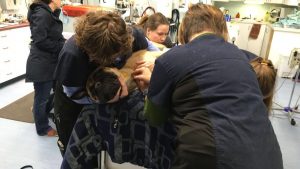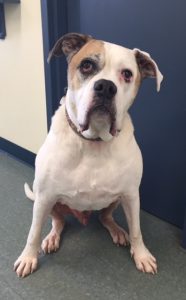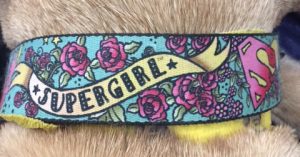Brenley – The Super Dog
Written By: Ashley Weatherbee, Vet Assistant
In 2012 my partner and I added to our family. We drove to Springfield, Massachusetts and picked up our new 9 week old Bullmastiff puppy. She was perfect and we fell in love immediately! She has stolen the hearts of everyone she’s met, including all my co-workers here at the Truro Veterinary Hospital. From the very beginning, we had plans for her. She’s graduated obedience classes, been to rally-o classes, and we still have hopes of her, one day, becoming a therapy dog. Her personality is amazing!

Working in the veterinary industry, I know how challenging and important it is to have blood donors. Truro Veterinary Hospital looks for dogs who weigh 23 kg or more but are not overweight, are aged between 1-8 years, are up to date on vaccines, are in general good health, and possess a good temperament. Females must be spayed and have never whelped a litter of puppies. Brenley fit these criteria perfectly!
The procedure of being a blood donor is short and not very painful. In preparation for blood collection, a small amount of hair is shaved from the donor’s neck and the area is cleaned well with a disinfectant. The blood is collected from the donor’s jugular vein. The collection takes about 5 minutes, with 1 unit of blood (approximately 450 mL) collected. Dogs need to remain calm for the procedure and in some cases, mild sedation may be necessary.
Being a parent of a donor participant comes with a commitment. We have agreed to be contacted any time, including the middle of the night in the event of an emergency. Brenley is kept up to date with her vaccinations, dewormed monthly and has routine bloodwork yearly. We also had her blood typed, but that is not necessary to become a donor.

In veterinary hospitals, like any human hospital, we come across cases where a patient needs a blood transfusion. Truro Veterinary Hospital has a Canine Blood Donor Program in place to aid in these emergency situations. Blood transfusions are needed for various reasons. These include trauma from motor vehicle accidents, supportive therapy during and after surgery, supporting dogs with bleeding disorders, and treating conditions such as parvovirus, anemia, and poison ingestion.
In June 2014, Brenley was called upon to help Bully. Bully is an American Bulldog and at the time he was 7 years old. His mom got a call from Doggie Day Care; he was not himself! They believed his abdomen seemed big and he was drooling more then normal. The Day Care brought him to us immediately where his mom was here waiting on his arrival.
Doctor Melissa assessed him upon his arrival. He was retching (non-productive vomiting), and his abdomen did indeed look distended. Radiographs confirmed his stomach was bloated (filled with gas). A stomach tube was inserted, removing liquid and some gas. Although this made him more comfortable, he was still retching. Blood was drawn, we repeated radiographs, and his stomach was now twisted, a dangerous condition called Gastric Distention and Volvulus, or GDV. He needed emergency surgery. His life was in danger!
Doctor Gwen performed a gastrotomy procedure. She removed lots of food and hotdog pieces, and could correct the torsion and secure his stomach with a gastropexy. Bully’s surgery was a success, but he was not out of the woods yet. Doctor Gwen was checking on Bully throughout the night. He became weak, able to stand and walk but was unsteady. His breathing was heavy and shallow, unlike his normal deep slow breaths. He was monitored very closely! Doctor Gwen requested repeat bloodwork to see if anything had changed. The results showed his packed cell volume or PCV (the amount of red blood cells in his system) was low. Before surgery, it was at 40% (normal 37% to 55%) and after surgery it had dropped to 24% with all other blood work normal. Brenley was needed!

I brought Brenley with me to work that day. Because this was her first time donating, we decided to sedate her and she donated 1 unit of blood to aid in Bully’s surgery recovery. Throughout the day, Bully’s transfusion ran and Brenley recovered from her sedation. A post transfusion PCV was run, and it was now 28%. Still not in the normal range, but an improvement! Brenley came home with me after my work day. She slept most of the evening, getting up to eat her supper and go outside for bathroom breaks. The following morning, she got up as if nothing happened. The only sign she had from donating blood was a shaved mark on her neck.
Doctor Gwen monitored Bully though the night and morning. His PCV the following day remained at 28% and he seemed to be feeling better. Happy that his PCV maintained, he was started on medications to help with his stomach, fed small frequent meals, and he was slowly weaned off his intravenous fluids during the day.
The following day and three days after surgery, Bully was stable enough to be discharged into the care of his owner. This year, 2017, is three years after Bully’s blood transfusion. He will also be celebrating his 10th birthday.

If you are interested in having your pet become a blood donor or you would like more information on Truro Veterinary Hospital’s Canine Blood Donor Program, please call our office at 902-893-2341.

0 Comments